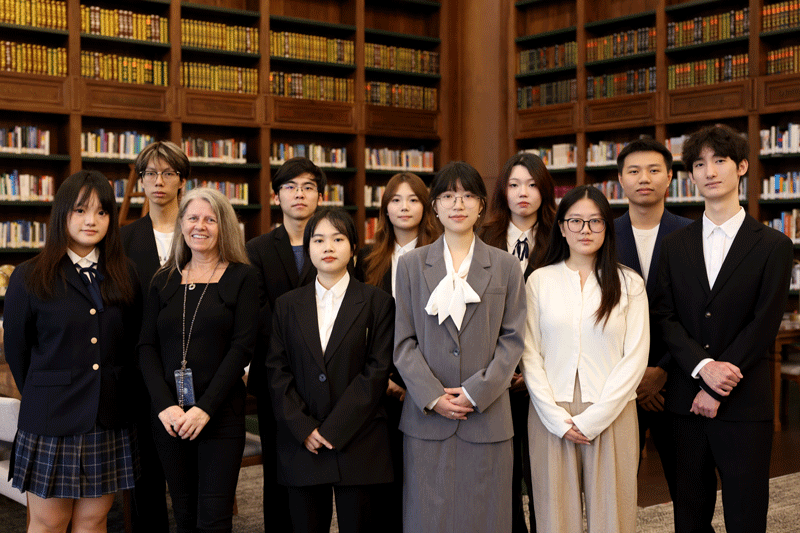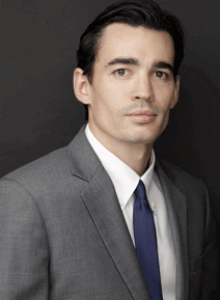Wenzhou-Kean University is one of three Sino-US universities, with Kean University being the only public university that has a campus in China (Stern, 2024). The mission of this alliance is to foster cooperation and encourage people, especially youth, to get to know each other better (Zhang, 2024). President Xi Jinping (2024) described these education exchanges as a “project for the future” for the development of China-US ties (Zhang, 2024).

Monica Carr, PhD, with Undergraduate Psychology students at Wenzhou-Kean University, fostering cross-cultural learning and understanding in China.
In late September 2024, we hosted a guest lecture for Psychology Major students at Wenzhou-Kean University. Undergraduate psychology students from all year levels listened to our guest speaker, who joined us in the lecture theatre via Zoom from his home in the United Kingdom. Jack Hyde is a British actor, model, and motivational speaker who has lived most of his life in Singapore. Jack joined us after his trip to the Toronto NoHo International Film Festival in September 2024, having been nominated for Best Actor in the Short Film “My Shards.”
Jack gave the students an insight into the preparation and work that he did when he acted in the role of Jadon, a young man with Schizophrenia. In addition, Jack explained to the students that he has Asperger’s syndrome. Jack gave the students a view into his world, in which he successfully navigated many challenges, graduated from LaSalle College of the Arts in Singapore, and rose to become a top young British actor who has already received numerous accolades for his professional performances.
“I’m so incredibly thankful to the university for not only giving me a platform to share my story but also to help spread the word about Asperger’s, Schizophrenia, and all forms of mental health,” said Jack. “Mental health is not a joke, and it should be taken seriously. I am so grateful for the positive response that I have received from the students,” he continued. “Not only do I want to inspire people in the same profession as me but, at the same time, and the main reason why I wanted to do this lecture, is to inspire those outside of it. A psychologist is definitely a tough job that requires a lot of patience, and I wish the students all the best in both that field and future!” said Jack.
Interacting with people on the autism spectrum in China is significantly different from in the United States. Pang and colleagues (2018) reported that only about 300 hospitals in China diagnose ASD, unlike in the US, where thousands of hospitals and clinics can conduct assessments and make a formal diagnosis. Social stigma and misunderstandings about autism abound. Recent research has indicated that only 9% of parents in China seek professional help upon noticing their child’s atypical early behaviors (Sun et al., 2015).
Accordingly, the chance for the students to listen to an individual like Jack was a rare and unique opportunity. Students were encouraged to write their reflections after the lecture, and this provided valuable insights into what they learned. “Psychology is a subject that help to understand and try to improve humans’ mentality. What psychologists need to seriously solve is there are a lot of people who are suffering from discrimination because of different mental world they have. Psychologists are the pioneers in letting this world become more open and inclusive. Those (not only whose having autism spectrum) patients need our help in-depth, though they may have difficulties speaking out and showing the world that they matter. I would be proud to become a psychologist to help those in need,” said Shan.
“This lecture contributes to my understanding of Psychology in ways of providing a personal experience in real life, which I think is an essential approach to learning psychology. Because psychology has a lot to do with real life, not only being limited to a single diagnosis but also covering many other mental disorders, such as anxiety and depression. In other words, we have multiple methods to learn psychology. Not only can we use the DSM-5, a reliable reference to diagnose mental disorders by corresponding symptoms, but we also can engage with case studies to learn their own feelings as we did with Jack,” said Yinyao.
“Through the lecture, I learned the importance of positive reinforcement in Applied Behavior Analysis for intervention therapy for individuals with Asperger’s Syndrome and Autism. In ABA, positive reinforcement encourages the target behavior by providing a reward or positive feedback. In short, ABA is an effective intervention to help individuals with Asperger’s Syndrome and Autism Spectrum Disorders improve adaptive behaviors through reinforcement and behavior modification techniques,” said Yihan.
Students also provided their take-away messages that they would share with others who may have never met someone in their community who is on the autism spectrum.
“There are lots of people having Asperger’s syndrome, but they are not diagnosed. Try to be good with people around you. Do not bully anyone,” said Zhiyi.
“First, it is important to recognize that people with autism are diverse and their experiences are unique. They may face challenges, but they also have the abilities and talents to enrich our communities. It’s important to learn about autism spectrum disorder and challenge any misconceptions or stereotypes we may hold. Empathy needs to be translated into practical acceptance and support. We should take action in real life. Encouraging open dialogue and providing appropriate help can greatly improve the quality of life for people with autism. By increasing awareness and understanding, we can work towards a more inclusive society. The easiest way is to treat everyone with respect, even if they are different,” said Xinyuan.
“Hey, have you heard of the Autism Spectrum? Maybe you’ve heard some stereotypes, like how they avoid communicating with people or possess super talents in certain areas. But let me tell you the truth: every person with Autism is unique. Don’t put labels on them, use your heart to feel them. They may differ from us in some ways, but from inner, we’re all the same! So, please, be open, empathetic, and patient to learn from their perspective, and then we can build a more inclusive environment where everyone is truly valued,” said Wenhui.
“If I were to share a message with someone who’s never met someone on the autism spectrum, it would be to not make assumptions. Autism varies a lot, so it’s important to be patient and understanding since you never know exactly what someone might be going through,” said Simeng.
“We should not discriminate against people with Autism. We also need to break the view that Asperger’s syndrome is only bad. These people may have extraordinary intelligence and language ability, and a strong interest in something. We asked Jack if his Asperger’s syndrome was a gift or a burden to him. Perhaps it is because of this experience that Jack’s great achievements in the film industry, of course, cannot be separated from his own efforts. Finally, I will tell others that people with Asperger’s syndrome do not lack emotion; they just express it differently from us, and they should be given more patience and understanding,” said YiXun.
“Do not be afraid if you meet people with strange behavior in your daily life. Because they may be autistic people, they don’t mean any harm, and they want to live like normal people. When we meet people with autism, we should treat them like normal people, and we should also actively provide them with suitable help,” said Xingyu.
“Understanding and acceptance are key – everyone benefits from patience and open-mindedness. Encouraging meaningful interactions can ultimately foster connection and appreciation for people on the autism spectrum,” said Aoyun.
Recent research into the prevalence of Autism in China has indicated similar rates as we see in Western countries, at around 1% (Sun et al., 2019). Through this guest lecture, and student’s reflective writing, it is evident that the digital learning tools now available enable important conversations and deep learning experiences beyond traditional textbooks and classrooms. In our increasingly globally connected world, it is of great importance that students can learn from foreign experts and, in turn, share the knowledge they have developed with readers abroad. These student voices highlight the understanding and compassion of the new generation of psychology students in China. The lecture closed with a parting message from Jack to the students, “When you are interacting with someone on the autism spectrum, don’t give up on them.”
Dr. Monica E. Carr is an A. Professor at Wenzhou Kean University, Wenzhou, Zhejiang Province, China, a Member of the Board of Directors, Genesis School for Special Education, Singapore, a Consulting Editor for Preventing School Failure, and an Editorial Board Member for Autism Spectrum News. For more information, please email mcarr.phd@gmail.com.
References
Pang, Y., Lee, C. M., Wright, M., Shen, J., Shen, B., & Bo. J. (2018). Challenges of case identification and diagnosis of autism spectrum disorder in China. A critical review of procedures, assessment, and diagnosis criteria. Research in Autism Spectrum Disorders, 53. 55-66. https://doi.org/10.1016/j.rasd.2018.06.003
Stern, A. (2024). Kean University commits to expanded international exchanges as Wenzhou-Kean University enters global spotlight. Trenton Daily. https://www.trentondaily.com/kean-university-commits-to-expanded-international-exchanges-as-wenzhou-kean-university-enters-global-spotlight/. Retrieved 11/28/2024
Sun, X, Allison, C., Matthews, F. E., Zhang, Z., Auyeung, B., Baron-Cohen, S, & Brayne, C. (2015). Exploring the underdiagnosis and prevalence of autism spectrum conditions in Beijing. Autism Research, 8(3), 250-260. https://doi.org/10.1002/aur.1441
Sun, X., Allison, C., Wei, L., Matthews, F. E., Auyeung, B., Wu, Y. Y., Griffiths, S., Zhang, J., Baron-Cohen, S., & Brayne, C. (2019). Autism prevalence in China is comparable to Western prevalence. Molecular Autism, 10:7 https://doi.org/10.1186/s13229-018-0246-0
Zhang, Y. (2024). Xi’s lasting support inspires faculties. China Daily. https://www.chinadaily.com.cn/a/202406/15/WS666cce09a31095c51c509094.html Retrieved 11/28/2024





